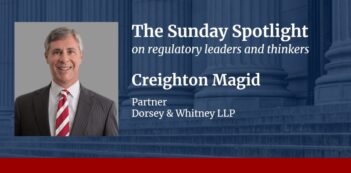
New book examines agents and entrepreneurs in today’s global environmental governance.
Walmart has an index to help its suppliers evaluate the sustainability of their products and performance—with the requirement that those companies either meet the standards or lose Walmart as a customer. The retail giant has developed sustainability standards for over two hundred different products, affecting the production practices of thousands of suppliers. For better or worse, Walmart is now a global rule-maker for sustainability.
Multinationals aren’t the only ones in the sustainability business. NGOs have created a new set of accounting practices to measure greenhouse gases that have become the gold standard in emissions accounting. Now over 90% of S&P 500 firms report their emissions, relying on private accounting standards to do so.
These two examples demonstrate that regulation is no longer the sole province of the state. Private authority—situations in which non-state actors make rules or set standards that other actors in world politics adopt—is now an indisputable reality.
An examination of environmental private regulation over the last century reveals that private authority has consistently exerted influence over the regulatory process. Although many claim that private forms of regulation are exploding at the international level, the story is more complex, and requires a rethinking of the concept of private authority. Proper specification of private authority requires distinguishing between two different forms: delegated private authority and entrepreneurial private authority. The theoretical implications of this conceptual move are important: we cannot simply explain the emergence of private authority, but must develop distinct explanations for each type.
In both types of private authority, private actors are viewed as legitimate rule-makers that secure consent from rule adopters. However, the origins of their authority differ. Delegated private authority is de jure; it occurs when states transfer authority to private actors. Private agents govern on behalf of states, often selected because of their expertise or capacity. Entrepreneurial private authority, by contrast, is de facto: that is, private actors create rules and then persuade others to adopt them. Rule adoption occurs through pressure, persuasion, or the provision of material benefits.
Despite the fact that states have been delegating to non-state actors since the 1940s, we know relatively little about private authority. We know a lot about a few cases. For instance, scholars have scrutinized the bond-rating industry in the wake of the financial crisis, and they have spilled much ink about how the Forestry Stewardship Council has produced forest regulations when states could not. But in general, we know little about how much private authority exists in world politics today, or how it has changed over time. There is little sense of the big picture, and thus, of the importance of private authority as a political phenomenon.
I have sought to remedy this deficiency by examining the history of delegated and entrepreneurial authority in global environmental governance. In my recently published book, I offer two new datasets to map out a research agenda for private authority in world politics. The first examines the history of delegation to non-state actors in environmental treaty-making from 1902-2002. Using a random sample of 152 multilateral environmental agreements spanning a century, I show that delegated authority has been a persistent, if limited, phenomenon: the state enlists private actors to help govern, but controls them carefully.
The second dataset focuses on entrepreneurial authority in the environmental arena from 1950 to the present. That dataset reveals that entrepreneurial authority is complex, messy, and growing quickly. An intricate landscape of private standards is emerging, often overlapping with international law.
Only by making this distinction between forms of authority do we uncover a somewhat counterintuitive finding: private actors are at once complementing and reconfiguring the authority of the state. Contrary to many claims, I show that private authority does not simply occur where states choose not to govern. Although it is often referred to as an instance of “governance without government,” the state is a central actor in understanding private authority. In the case of delegated authority, states explicitly tap private actors to serve as agents. In the case of entrepreneurial authority, private actors complement, expand upon, and in a few cases, even form the basis of global regulation.
Second, the data demonstrate that when the concept of private authority is properly disaggregated, two very different stories emerge. Delegated authority plays a small but consistent role in international environmental law over the last fifty years. By contrast, entrepreneurial authority is a relatively new phenomenon, which has largely occurred in the last two decades. This new and fast-growing area of private authority spans a diversity of environmental issues ranging from organic food to building practices. New data presented in my recent book suggest that we have only scratched the surface in understanding the breadth and dynamics of this increasingly common form of global governance.
Finally, it is important to explain why private authority emerges and assumes the form that it does. When powerful states agree and there is a strong focal institution—usually an international organization—to screen and monitor agents, delegated private authority emerges. By contrast, when powerful states cannot agree, and there is no focal institution, or it is weak, then entrepreneurial authority is more likely to emerge.
Delegated authority is in large part a function of the expertise of agents. Entrepreneurial authority, by contrast, emerges when public regulation is weak, or when private rules can furnish benefits that public authority cannot—including reputational benefits. It does not, however, appear to emerge to solve coordination problems.
The case of climate change provides a helpful illustration. The Clean Development Mechanism of the Kyoto Protocol offers an example of delegated private authority. States delegated the critical task of monitoring carbon offset projects to private actors. As a result, private agents have become the “atmospheric police” of the Kyoto Protocol. In this instance, large emitters—including the US, Canada and Australia—favored creating a market for carbon offsets and delegating monitoring to private agents. This decision was facilitated by the presence of the Secretariat of United Nations Framework Convention on Climate Change—an administrative body capable of monitoring the monitors. The decision to delegate was relatively quick and not contentious.
By contrast, the Greenhouse Gas Protocol—a set of accounting standards used to measure and report corporate greenhouse gas emissions—offers an example of entrepreneurial authority. The Protocol was created by two NGOs and has become the gold standard in corporate level accounting. Whereas states were in agreement about the Clean Development Mechanism, there was much more contention about the broader issue of emissions trading. Disagreement among major emitting nations led to protracted negotiations about whether and how such a policy would be implemented. Their inability to come to an agreement created considerable regulatory uncertainty, as well as a regulatory vacuum, which non-state actors filled through the creation of the Greenhouse Gas Protocol.
Distinguishing between the two types of private authority and understanding conditions when each emerges offers new insights about a growing and important global phenomenon. But of course, it also raises further questions for future research and policy analysis: Can we manage global problems with such a complex landscape of actors? What is the meaning of state sovereignty in a world with multiple sites of authority? Answering these questions only becomes more urgent as we consider the growth of technology, environmental risks, and the regulations put in place to manage them. As these issues become larger fixtures in world politics, private actors are likely to become more prominent as agents. Researchers therefore need to understand better the interactions between states and private actors.




